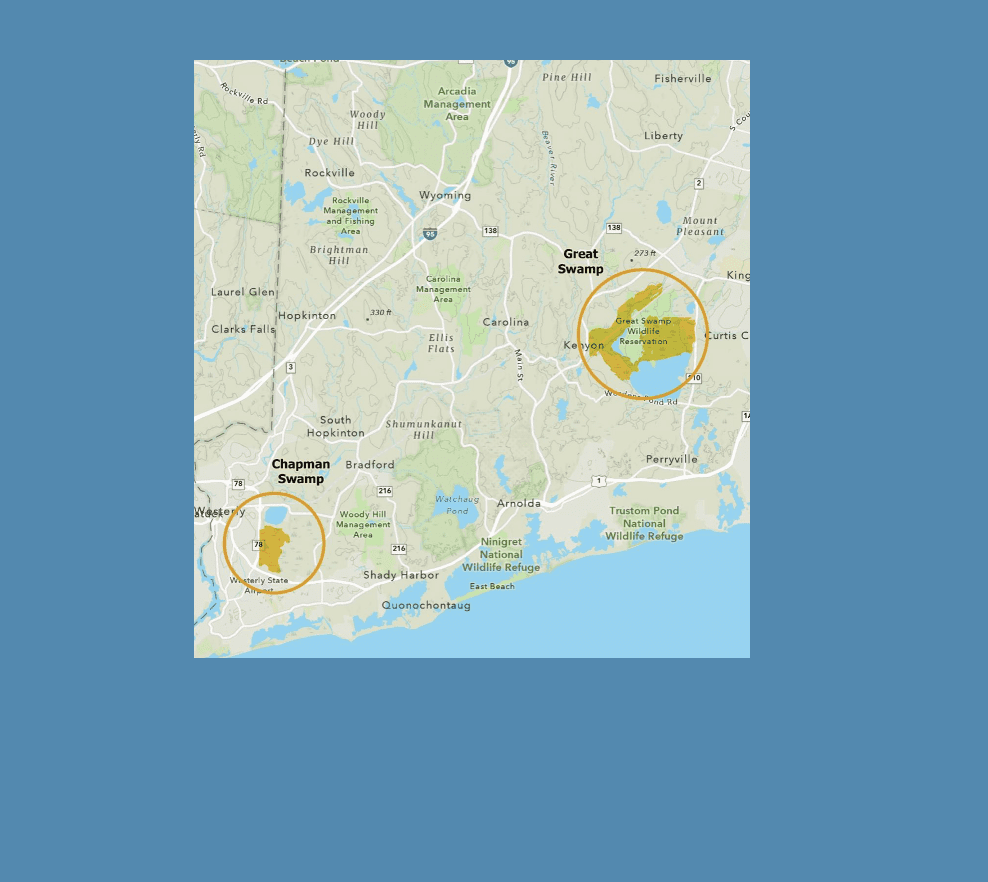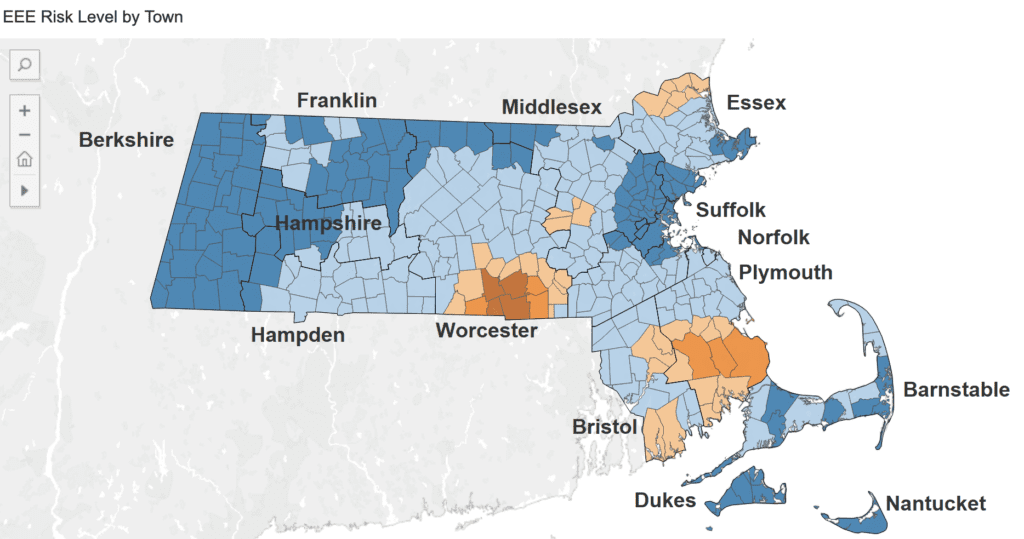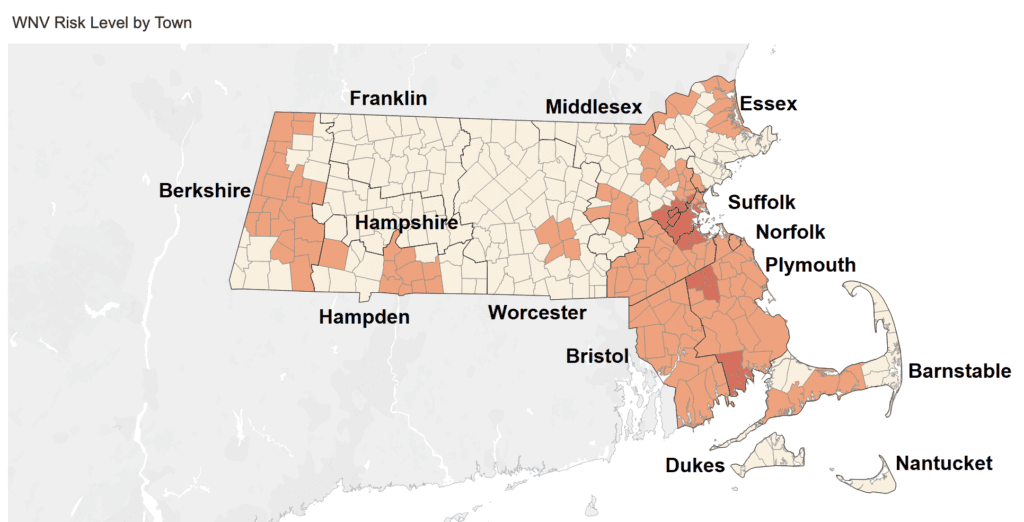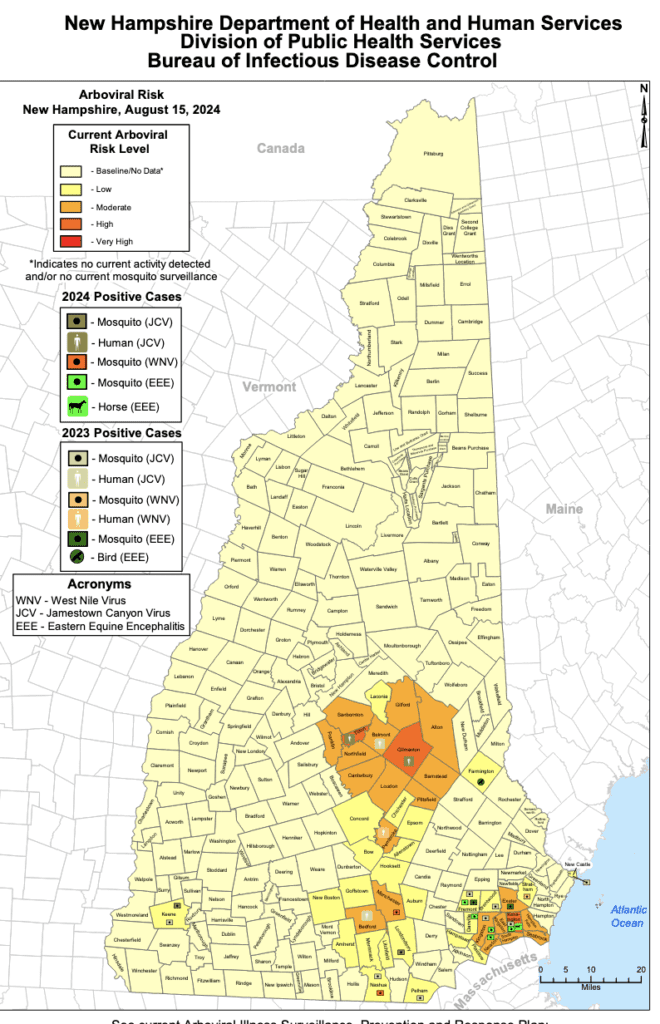Search Posts
Recent Posts
- To Do in RI: 2-day Newport Flower Show – Authors on floral design to speak June 21, 2025
- In the News… quick recap of the week’s news 6.21.25 June 21, 2025
- Providence Art Club Prestigious National Open Juried Exhibition Begins June 21, 2025
- Burn with Kearns: “30-day Shreds” Fail the 50+ Market. What To Do. – Kevin Kearns June 21, 2025
- Rhode Island Weekend Weather for June 21/22, 2025 – Jack Donnelly June 21, 2025
Categories
Subscribe!
Thanks for subscribing! Please check your email for further instructions.

EEE risk increasing. Death in NH. RI will aerial treat for mosquitos in 2 areas. What you need to know.
RI DEM: Targeted Aerial Application of Mosquito Larvicide Over Great Swamp in South Kingstown and Chapman Swamp in Westerly
The Rhode Island Department of Environmental Management (DEM) announced they will be conducting an aerial application of mosquito larvicide in Westerly and South Kingstown this Thursday, Aug. 29th and Friday, Aug. 30th, weather permitting. A licensed contractor, North Fork Helicopters, will conduct the spraying across 3,000 acres of Chapman Swamp in Westerly and Great Swamp in South Kingstown.
The application, which consists of pellets that kill mosquito larvae being dropped by a helicopter into the targeted wetlands, will take place between 7 AM and 7 PM. The larvicide applications will not target open bodies of water, and treatment areas do not include Worden Pond in South Kingstown or Chapman Pond in Westerly. In the event of inclement weather, a rain date will be announced. The larvicide used, known as Bti, does not pose a risk to humans or the environment.
Larviciding is recommended as part of the state’s action plan to control West Nile Virus (WNV) and Eastern Equine Encephalitis (EEE) Virus and is considered an effective strategy to reduce mosquito populations and related disease risk.
In the most recent weekly RI Mosquito Report state officials reaffirmed that the high amount of EEE virus activity in Washington County indicates a significant risk in the area and an elevated risk level throughout Rhode Island.
Bti, a naturally occurring bacterium applied in granular form to control mosquito breeding in swamps and other breeding habitats. It is applied to standing water where developing larvae are found. Bti is an environmentally friendly product whose toxins specifically affect the larvae of only mosquitoes, black flies, and fungus gnats and do not pose a risk to human health. These toxins do not affect other types of insects including honeybees. It is approved for pest control in organic farming operations. Aerial application of larvicide is one of the most effective tools to reduce the number of biting mosquitoes by preventing the larval stage from maturing into adults.
The Town of Westerly conducted an aerial application of Bti on Chapman Swamp in April, as part of an annual application conducted by the Town since 1997 to help control mosquito breeding, given the area’s remote location and large footprint.
Great Swamp Management Area, more areas to be closed for two days
During the application period, all DEM access points within Great Swamp Management Area will be closed and DEM recommends avoiding the area. The Great Swamp Shooting Range(GSSR) will be closed on Thursday, Aug. 29, and Friday, Aug. 30, with normal operations resuming on Saturday, Aug. 31. The town of South Kingstown will close a portion of the William C. O’Neill (South County) Bike Path which runs through the treatment area, from Ministerial Road to the Kingston Train Station, during the application period.
Last week, DEM, the Rhode Island Department of Health (RIDOH) and the Mosquito Borne Disease Advisory Group (MDAG) recommended that schools, organizations, and communities consider “smart scheduling” of outdoor activities scheduled during early morning or dusk hours be rescheduled to earlier in the afternoon or relocated to an indoor venue. The “smart scheduling” of events is intended to help minimize the risk of mosquito bites for players, coaches, and spectators.
Personal protection is the first line of defense against mosquitoes that may carry diseases and the most effective way to avoid infection. Rhode Islanders should take the following measures to protect themselves from mosquito bites:
- Put screens on windows and doors. Fix screens that are loose or have holes.
- Consider rescheduling outdoor activities that occur during the evening or early morning at sunrise and sundown (when mosquitoes carrying the EEE virus are most active). If you must be outside, wear long-sleeved shirts and pants and use bug spray.
- Use EPA-approved bug spray with one of the following active ingredients: DEET (20-30% strength), picaridin, IR3535, and oil of lemon eucalyptus or paramenthane. Always read the label and follow all directions and precautions.
For little ones:
RIDEM:
- Do not use bug spray with DEET on infants under two months of age. Check the product label to find the concentration of DEET in a product. The American Academy of Pediatrics recommends that repellents contain no more than 30% DEET when used on children. Children should be careful not to rub their eyes after bug spray has been applied on their skin. Wash children’s hands with soap and water to remove any bug spray when they return indoors.
- Put mosquito netting over playpens and baby carriages.
For additional mosquito prevention tips, videos, and local data from RIDOH, visit health.ri.gov/mosquito.
CDC: When using insect repellent on your child:
- Always follow label instructions.
- Do not use products containing oil of lemon eucalyptus (OLE) or para-menthane-diol (PMD) on children under 3 years old.
- Do not apply insect repellent to a child’s hands, eyes, mouth, cuts, or irritated skin.
- Adults: Spray insect repellent onto your hands and then apply to a child’s face.
- If also using sunscreen, always apply insect repellent after sunscreen.
Around New England


Massachusetts is also conducting targeted aerial applications – in Carver, Halifax, Kingston, Middleborough, Plymouth, Plympton, Rochester, and Wareham. A man in his 80s has EEE in the Worcester area, current condition unknown. Truck-based spraying will take place in the following five towns in southern Worcester County: Douglas, Dudley, Oxford, Sutton, and Uxbridge. Spraying begins at dusk and will end by dawn each day. Should you see planes in the air or trucks in your area prior to dusk, they are either getting in position or scouting out the area prior to starting the spray.

A New Hampshire man died of EEE yesterday, officials announced. He was hospitalized, testing positive for EEE, due to severe central nervous system disease. The death is the first known in a decade in New England, acccording to reports.
Rhode Island’s upcoming outdoor events & festivals?
When asked, the RIDEM responded about events being held outdoors, particularly festivals, this weekend, and through the end of September, the critical time of concern. DEM has no efforts planned for Pawtucket at this time, site of the Pawtucket Arts Fest and the Slater Park Arts Festival this weekend. RIDEM says, “2019 was the last time Rhode Island conducted aerial spraying. In situations where there is an elevated risk of human disease, state or local officials may consider the use of an aerial pesticide spray in the evening and overnight hours to reduce the number of infected, adult mosquitoes in the specific areas of elevated risk. The state has a Mosquito Response Protocol, there is no recommendation currently to spray adulticide in areas of Rhode Island, with the exception of the South Kingstown and Westerly area… As the season continues, officials at the Rhode Island Department of Environmental Management (DEM) the Rhode Island Department of Health (RIDOH) and the Mosquito Borne Disease Advisory Group (MDAG) will continue to evaluate the risk level statewide.
The very young and the very old are the most at risk for serious complications and death from EEE. 30-40% of all patients who get EEE will die. Many will be left with serious complications.
For more information on DEM programs and initiatives, visit www.dem.ri.gov. Follow DEM on Facebook, Twitter (@RhodeIslandDEM), or Instagram (@rhodeisland.dem) for timely updates.
